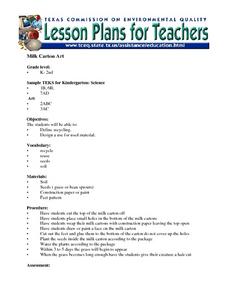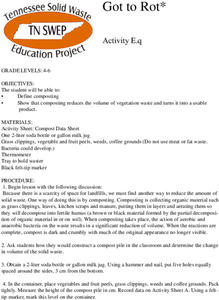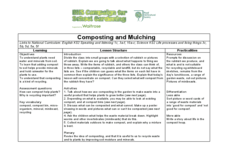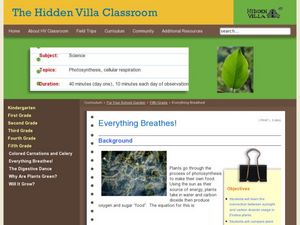Curated OER
Titration: Standardization of a Base and Analysis of Stomach Antacid Tablets
Titration experiments don't have to give your high schoolers a stomachache. Study the ways to titrate an acide with a base in an engaging science experiment, which involves creating solutions and performing titrations. Pupils prepare a...
Curated OER
Invisible Life
By setting up an aquarium in the classroom, learners are able to describe some macroscopic and microscopic organisms that are found inside. This well-designed, and educationally rich lesson requires pupils to use microscopes to view...
Curated OER
Our Natural Resources
Your class will learn about natural resources and man-made items and differentiate between them. They chart resources from seven pictures and explain how each natural resource is used.
Curated OER
Reading Comprehension 4
Ever needed a reason to stop eating meat? Read this interesting (and slightly disgusting) passage with your class to assess reading comprehension.
Curated OER
De"compost"ition
Students develop an understanding of the decomposition process and the parameters which influence the rate at which it occurs.
Curated OER
Structure of Matter
Fifth graders, in groups, distinguish between mixtures, solutions and suspensions.
Curated OER
Designing an Ecologically Sound City
Fifth graders design an "ecologically sound" city. They write laws for the city to help make all citizens aware of their ecological responsibilities and propose alternative power sources for light and heat.
Curated OER
Trash Count
Students identify pollution around their local community. They discuss the sources of polution and categorize objects based on their properties. They discover ways to make changes to the environment and how to inform the public.
Curated OER
Got to Rot
Students make their own compost in a 2-liter jug and determine the actual volume loss in the composted material over a six-month period.
Curated OER
Rivers Through Time
Learners read or have the book A River Ran Wild read to them. They discuss and reflect on the messages presented in the book. Students use their listening comprehension skills to draw conclusions. Learners articulate several examples of...
Curated OER
Ways To Go Green
In this environmental awareness worksheet, learners learn how to "go green" by reading 10 tips that can be used in everyday life. Students answer 10 multiple choice questions. This is an online interactive worksheet.
Curated OER
Structure of the Nephron
In this nephron worksheet, students color the parts of the nephron and answer five questions about the structures and functions of the parts of the nephron.
Curated OER
Composting and Mulching
Second graders define composting and recognize what can be composted. For this composting and mulching lesson, 2nd graders classify objects or pictures as good or bad for composting. Students write a story about life in the compost heap.
Biology Junction
Flatworms
In this flatworms instructional activity, high schoolers identify and color the different parts of a flatworm. They complete 14 short answer questions related to the topic.
Curated OER
Which Came First, the Chicken or the Egg?
In this worksheet, students answer questions regarding the function of an egg.
Curated OER
The Chemical Detective
In this chemical detectives worksheet, high schoolers perform 6 tests on various unknown solutions including a test for chloride ion, sulphate ions, carbonate ions, iron (III) ions, iron (II) ions and copper (II) ions. Students record...
Curated OER
Properties of Matter
In this properties of matter worksheet, students answer 11 questions about the various properties of matter such as density, elasticity, malleability, and how hard or brittle a substance is.
Curated OER
Cell Parts
In this biology worksheet, students read about the parts of both plant and animal cells and examine cell diagrams. They read about the function of cell parts before answering 11 online fill in the blank questions.
Curated OER
Zoo Poo
Students use Internet research to determine the amount of carbon dioxide produced per unit energy for biomass and coal. In this alternative energy lesson, students research to find out how much energy and carbon dioxide several coal and...
Cornell University
Chemical Reactions
Investigate the Law of Conservation of Mass through a lab exploration. Individuals combine materials to initiate chemical reactions. They monitor for signs of reactions and measure the masses before and after the reactions for comparison.
Curated OER
Everything Breathes!
Fifth graders test plants in the dark and in the light to see which grows better and produces more carbon dioxide. In this plants lesson plan, 5th graders also create ways for plants to go through photosynthesis that they can observe.
K12 Reader
Taking Care of Earth
Provide a brief introduction to ecology and conservation with a reading passage. Learners can read the text, answer the five related questions that are included on the page, and discuss the reading.
Curated OER
Recycling and Composting
Students set up composting sites that allow food scraps and paper to be recycled by nature. They are introduced to one aspect of recycling; composting. Students see how God recycles as the worms change garbage into something that brings...







